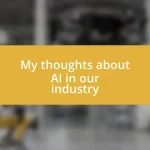Key takeaways:
- Emphasis on technology in talent acquisition, with AI and data analytics streamlining hiring processes and improving candidate experiences.
- Shifting focus towards diversity and inclusion, enhancing team creativity and cultural fit through broader hiring practices.
- Growing importance of employer branding and soft skills, shaping candidate perceptions and overall workforce dynamics for future success.
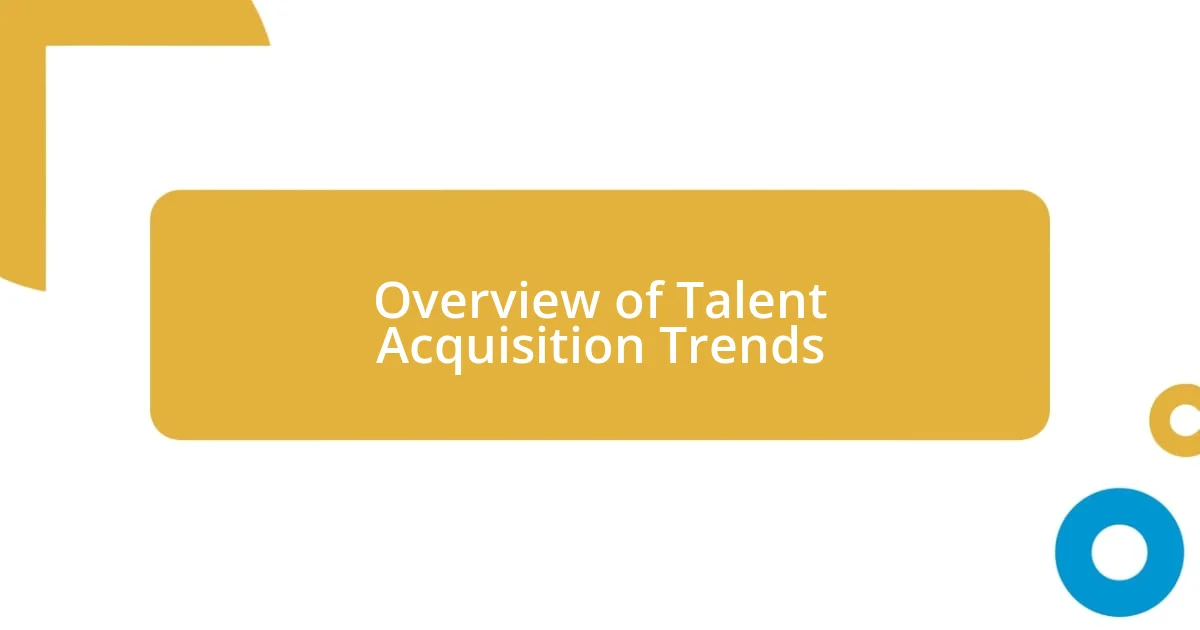
Overview of Talent Acquisition Trends
In recent years, the landscape of talent acquisition has shifted dramatically, embracing technology in ways we never imagined. I remember the first time I saw an AI-powered recruiting tool; it felt like stepping into the future. Can you believe how far we’ve come? This trend means that predictive analytics and automation are now playing pivotal roles, streamlining the hiring process and reducing time-to-hire.
Diversity and inclusion have moved to the forefront, becoming more than just buzzwords; they’re critical for building resilient teams. When I was part of a hiring panel that prioritized diverse candidates, the richness of perspectives brought into the room was palpable. Have you noticed how workplace dynamics change when everyone’s voices are heard? It’s a game changer that fosters innovation and creativity.
Moreover, candidate experience is now recognized as essential to attracting talent. I’ve seen firsthand how personal touches during the interview process can leave lasting impressions. Think about it: when was the last time a simple follow-up made you feel valued as a candidate? This trend emphasizes the importance of relationships, not just resumes, in today’s talent acquisition strategies.
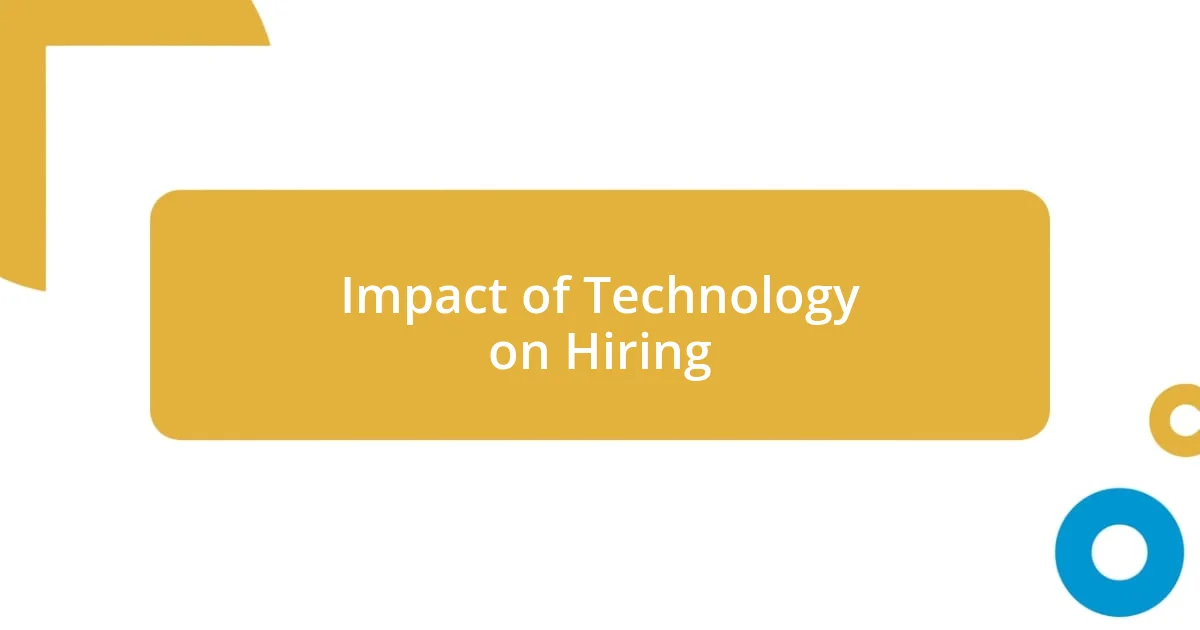
Impact of Technology on Hiring
The impact of technology on hiring is profound and continues to evolve. I recall attending a conference where a panel discussed virtual reality (VR) assessments. Just imagining candidates stepping into a realistic job scenario through VR is thrilling! It’s fascinating to think how this approach can provide insights into a candidate’s skills in ways traditional interviews simply can’t.
Here are some key technology trends reshaping the hiring landscape:
– AI-driven Resume Screening: Reduces unconscious bias by focusing on candidate qualifications rather than demographics.
– Chatbots for Initial Interactions: Enhance candidate experience by providing instant answers to inquiries 24/7.
– Data Analytics: Helps recruiters identify successful hiring patterns and refine job descriptions for better targeting.
– Video Interviewing Tools: Allow for flexible scheduling and the ability to assess body language without geographical constraints.
These advancements not only streamline the hiring process but also create a more engaging experience for candidates, which I find incredibly valuable.
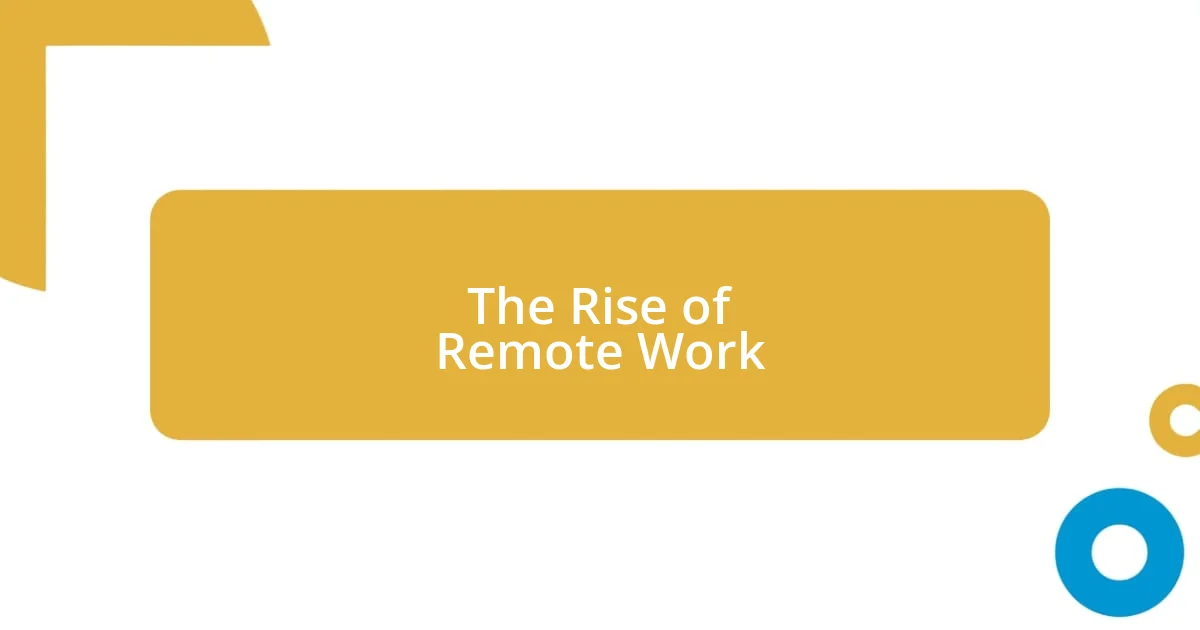
The Rise of Remote Work
The surge in remote work has fundamentally transformed how we approach talent acquisition. When I first experienced fully remote teams, I felt a wave of excitement coupled with skepticism. Would collaboration still flourish? Interestingly, it turned out that distance prompted us to innovate our communication strategies; virtual brainstorming sessions became a norm, and surprisingly, ideas flowed more freely without geographical constraints.
I also found that embracing remote work opened up a world of possibilities for accessing diverse talent. For instance, one of my previous teams consisted of individuals from different time zones. It was eye-opening to see how our varied backgrounds influenced our perspectives and decision-making. I often reflect on how that diversity sparked creativity, pushing the envelope on projects.
Additionally, the remote work movement has highlighted the importance of cultural fit over sheer proximity. I remember participating in a remote hiring process where the focus shifted entirely towards assessing how candidates aligned with our values rather than just their technical skills. This change encouraged a more profound connection among team members and helped cultivate a sense of belonging, an element that I now believe is paramount in any successful organization.
| Aspect | Traditional Work Environment | Remote Work Environment |
|---|---|---|
| Collaboration | In-person meetings, limited engagement | Virtual brainstorming, broader participation |
| Diversity Access | Local talent pool only | Global talent pool, varied perspectives |
| Cultural Fit | Geographical proximity emphasis | Value alignment focus |
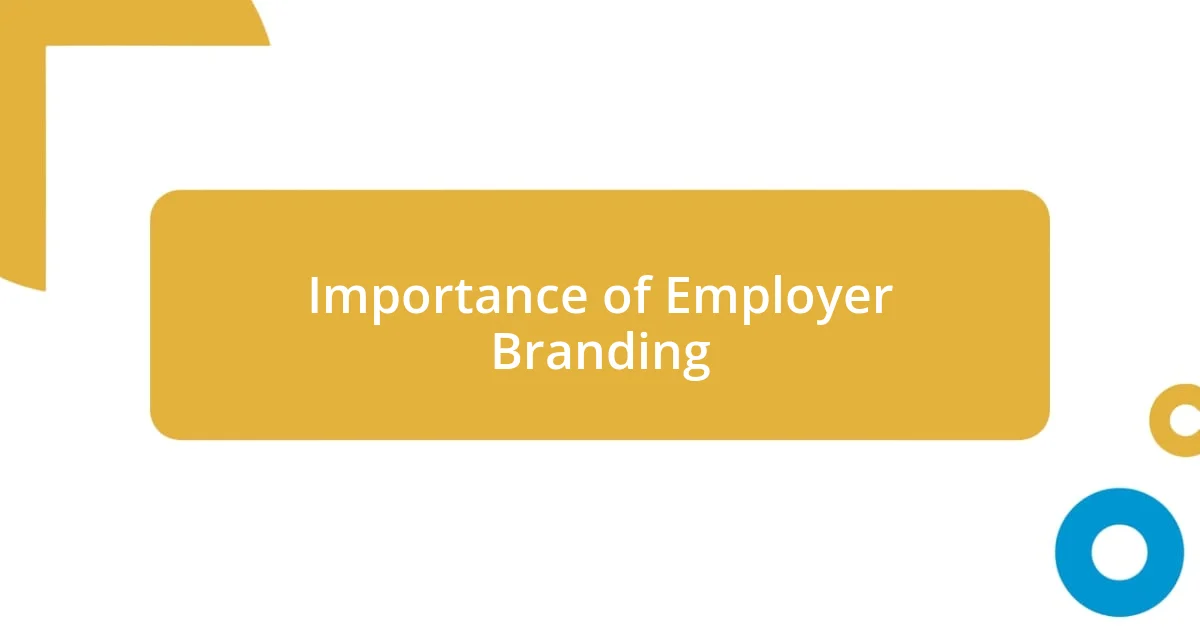
Importance of Employer Branding
Employer branding has become a pivotal aspect of talent acquisition that I genuinely believe can make or break an organization’s appeal to potential candidates. I remember when I was part of a hiring team for a well-known tech firm. One of the things that stood out to me was how prospective employees often mentioned our reputation as a great workplace during interviews. It was clear: a strong employer brand attracts not just applicants, but the right applicants.
In my experience, candidates today are research-savvy and tend to dig deep into a company’s culture, values, and employee experiences before applying. I once overheard a candidate expressing concern about a company that had a great product but lacked positive reviews on employee review sites. It really struck me—and underscored the critical importance of authentic branding. When organizations invest in shaping and maintaining a positive employer brand, they not only enhance their recruitment efforts but also retain top talent.
Think about it: what kind of message do you send when your employees are your loudest advocates? From my perspective, fostering a transparent and engaging environment can cultivate genuine enthusiasm, whether through employee testimonials or showcasing company culture on social media. The overwhelming impact this has on attracting talent is remarkable—because in a competitive job market, who wouldn’t want to work for a company that values its people?
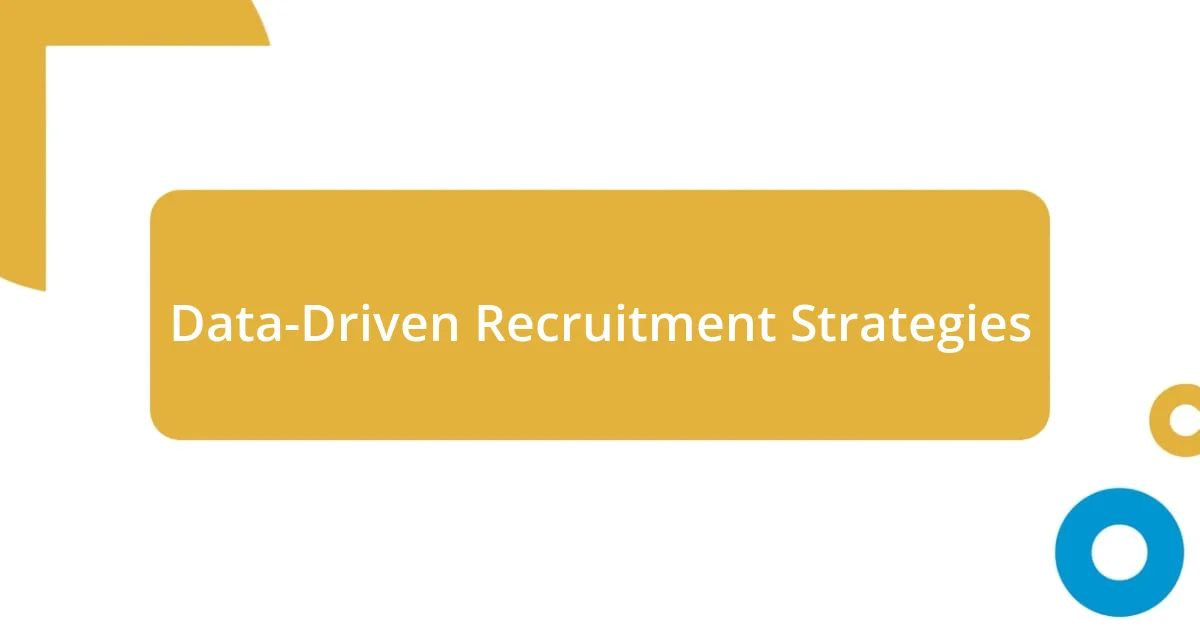
Data-Driven Recruitment Strategies
Data-driven recruitment strategies are reshaping how I approach hiring. By leveraging analytics, organizations can pinpoint the qualities that lead to successful hires. For example, at my last company, we utilized data to analyze which interview questions correlated with long-term employee performance. This was a game-changer. I felt empowered knowing that we could refine our questions based on solid evidence, enhancing our overall hiring effectiveness.
One of my favorite tools involved assessing candidates’ skills through predictive analytics. I remember helping to implement a system that evaluated past performance data and aligned it with current job requirements. The results were stunning. Not only could we forecast a candidate’s likelihood of thriving in our environment, but we also reduced the time spent on hiring. This efficiency allowed us to focus on nurturing relationships with top talent, rather than getting bogged down in endless interviews.
It’s fascinating to think about how data can strip away biases in recruitment. I’ve seen firsthand how data-driven insights encourage more objective decision-making. Reflecting on a past hiring cycle, I noticed that the metrics highlighted candidates we might have overlooked based solely on gut feeling. This shift didn’t just diversify our team; it sparked conversations and ideas I hadn’t anticipated. Doesn’t it make you wonder about the talent we might miss if we rely solely on intuition?
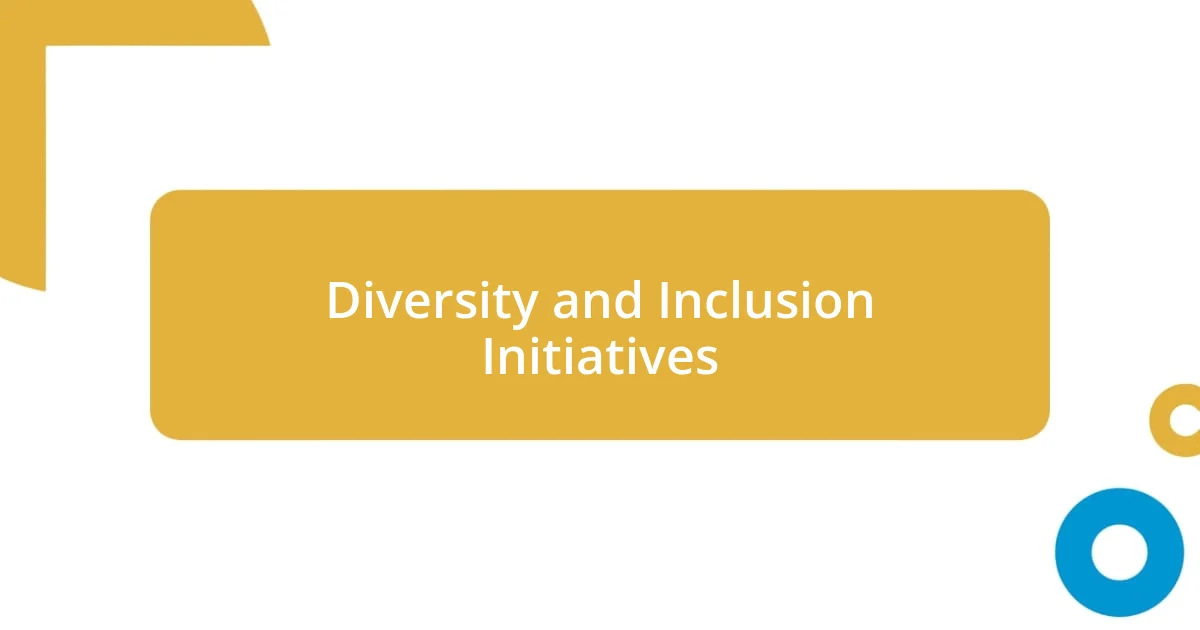
Diversity and Inclusion Initiatives
I’ve often thought about the powerful role that diversity and inclusion initiatives play in shaping an organization’s culture. I recall working on a project where we consciously broadened our hiring pool to include candidates from various backgrounds, and the difference this made wasn’t just in numbers—it changed the conversation within our team. When you have diverse voices, you don’t just fill roles; you fuel creativity and innovation. Isn’t it fascinating how a simple change in approach can lead to such a significant shift in perspective?
Diversity is a core value that goes beyond mere compliance; it reflects a commitment to fairness. A few years ago, I participated in a training program focused on unconscious bias, and it opened my eyes. I never realized how much my own experiences shaped my perceptions of potential candidates. That training made me rethink our recruitment strategies and push for a more inclusive approach across the board, fostering a workplace where everyone feels valued. Wouldn’t you agree that when individuals feel included, they’re more likely to thrive and contribute fully?
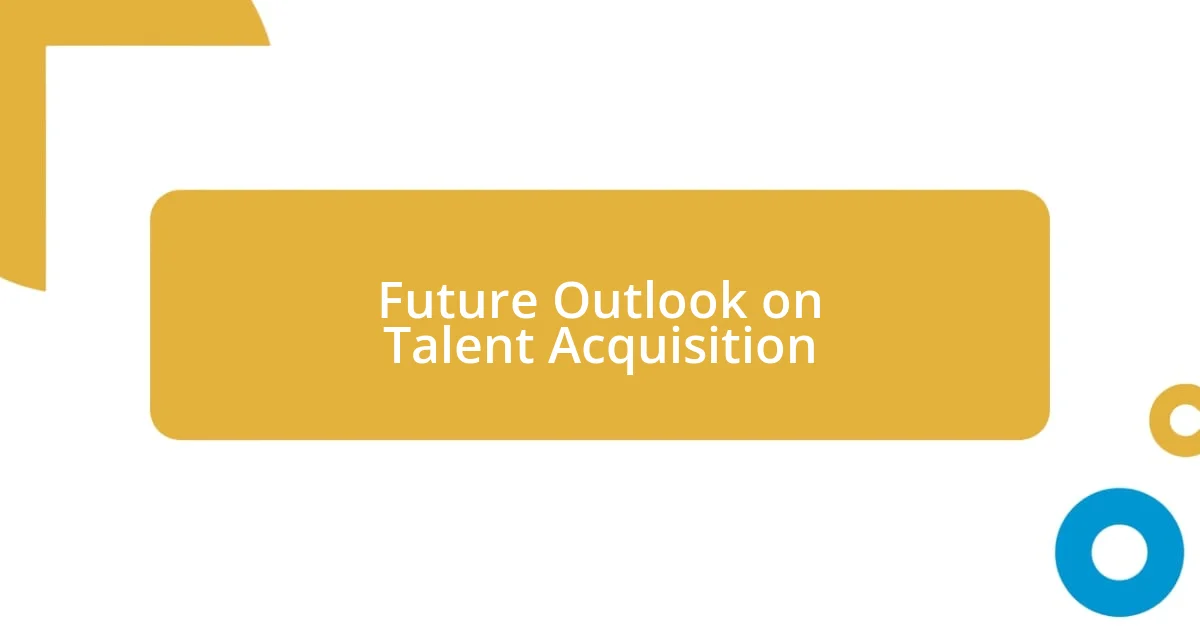
Future Outlook on Talent Acquisition
As I reflect on the future of talent acquisition, I can’t help but feel that technology will play an increasingly pivotal role. For instance, I’ve already seen chatbots streamline initial candidate interactions, allowing us to maintain a personal touch while efficiently managing inquiries. Isn’t it intriguing how these tools have started to make the candidate experience feel more seamless? It’s not just about speed; it’s about ensuring candidates feel valued from the get-go.
Another trend I anticipate is the rise of remote work options. My experience with a fully remote hiring process transformed how I view talent acquisition. The ability to recruit from a global talent pool not only increases diversity but also brings unique perspectives that could reshape our company culture. Have you ever considered how geographical boundaries might limit the creativity and innovation within teams? I know for a fact that opening up borders in our hiring practices has led to incredible collaborations I wouldn’t have dreamed possible.
Looking ahead, I believe that soft skills will gain more prominence in hiring criteria. During a workshop I attended, we discussed how resilience and adaptability have become essential traits in the modern workforce. Reflecting on my own journey, I once prioritized technical skills over interpersonal abilities, only to realize later the value of a candidate’s emotional intelligence. How do we measure those qualities effectively? It’s a challenge that I think we need to embrace, as it could significantly impact team dynamics and overall job satisfaction.













